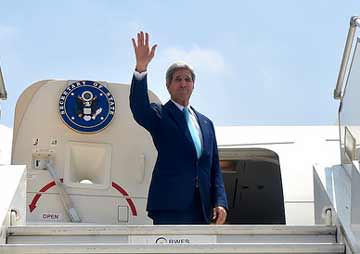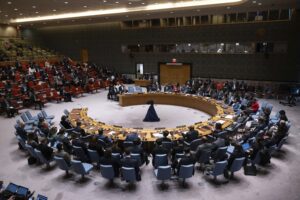Give Kerry a Break
Secretary of State John Kerry was right to push for an immediate cease-fire in Gaza earlier this week.
Secretary of State John Kerry was right to push for an immediate cease-fire in Gaza earlier this week. All outside parties should do everything they can to end a war in which both Israel and Hamas have seemed willing to fight to the death of the last Palestinian civilian.
Kerry has been slammed as naive for pressing Israel to end its attack, which as of this writing has cost the lives of more than 1,300 Palestinians and 59 Israelis. The contention of Kerry’s critics — essentially that more killing of innocent civilians is justified if, in the end, Hamas is defanged and discredited — strikes me as morally untenable. Israel’s undeniable right to self-defense does not extend to shelling a school crowded with unarmed refugees.
It is understandable that Israel would want to destroy tunnels that terrorists might use for attacks or kidnappings. But Kerry’s cease-fire proposal did not call for the Israeli armed forces to withdraw from Gaza, and U.S. officials reportedly gave assurances that Israel could continue its demolition of the tunnels during any pause in the fighting.
The real objection of those who ridicule the secretary’s efforts seems to be that he came up with a plan that Hamas and its key remaining allies — the Islamist governments of Qatar and Turkey — could actually accept.
To say that Hamas is increasingly isolated is an understatement. Its most important patron — the Muslim Brotherhood-led government in Egypt — is gone, replaced by the brutally anti-Islamist regime of President Abdel Fatah al-Sissi. Rather than come to Hamas’ defense, Egypt has sealed the border crossing at Rafah, in effect helping Israel squeeze Gaza in a vise.
Meanwhile, the governments of Saudi Arabia and Jordan, which usually provide rhetorical and diplomatic support to the Palestinian side during these periodic clashes, have been publicly silent. And the West Bank leadership of the Palestinian Authority under Mahmoud Abbas has been anything but full-throated in calling for an end to the Israeli campaign.
These Arab regimes see the Islamist political movement — which is threatening to fill the power vacuums left by the tumult of the Arab Spring — as a potentially mortal threat. Crushing Hamas would be a major blow against the Islamists. So why press the Israelis to stop?
This is the broader strategic context that Kerry allegedly fails to appreciate. But I disagree, both on Kerry’s supposed inability to see the big picture and on what that picture really looks like. It would be a tragic mistake, in my view, to accept the proposition that U.S. policy in the Middle East must be entirely shaped by the Islamists versus secularists framework as construed by pro-Western — but clearly self-interested — governments in the region.
The view that Israel should be left to “finish the job” against Hamas sounds like clear-eyed realpolitik. Actually, however, it is an illusion. There are two major problems with having U.S. policy adopt this approach.
First is the tremendous loss of human life. It matters that civilians are in the line of fire between Israel and Hamas — even if, in some instances, it seems clear that Hamas put them there. Israel is and will remain one of America’s closest allies. But while it is not possible to specify an exact number of acceptable Palestinian casualties, that number has clearly been surpassed.
Second, it seems obvious to me that further smashing of Hamas is unlikely to bring either Israel or the United States closer to what should be our common strategic goals.
Eventually, Islamist militants in Gaza — whether or not they remain in power — will dig new tunnels and restock their stores of rockets. Even if Hamas were to cease to exist as a formal organization, how long would it be before something very much like Hamas arose to take its place?
The way for Israel to minimize Islamist radicalism in Gaza and the West Bank is to show Palestinians a brighter potential future under moderate secular leadership. Instead, Israel undermines Abbas by building on land that would have to be Palestinian territory in any equitable two-state solution.
As far as U.S. interests are concerned, it is obvious that our policy should be to fight Islamist terrorist groups such as the Islamic State. But we should not lose sight of the fact that radical Islam, as a regionwide phenomenon, is an ideological force that cannot be bombed out of existence.
Channeling the Islamist impulse onto a constructive path is one of the great international challenges of our age. Killing civilians in Gaza makes that task even harder.
Eugene Robinson’s e-mail address is eugenerobinson(at)washpost.com.
© 2014, Washington Post Writers Group
Your support matters…Independent journalism is under threat and overshadowed by heavily funded mainstream media.
You can help level the playing field. Become a member.
Your tax-deductible contribution keeps us digging beneath the headlines to give you thought-provoking, investigative reporting and analysis that unearths what's really happening- without compromise.
Give today to support our courageous, independent journalists.






You need to be a supporter to comment.
There are currently no responses to this article.
Be the first to respond.